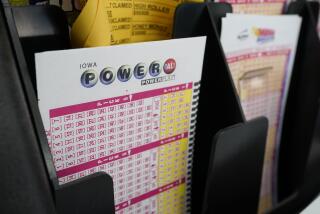Settle for lottery’s dregs? Not a chance, litigant says
DENVER — The only thing LaVonne Watkins buys at a convenience store these days is a cold soda on a hot day.
She doesn’t touch the scratch-off instant lottery tickets, which she used to snap up weekly in the hope of winning $10,000. Watkins, 35, a home-care provider, stopped buying them years ago when she learned that she had purchased Luck of the Zodiac tickets two months after the top prizes were won -- meaning that while she forked over her money, her chance at the grand prize was zero.
“I thought I was purchasing a fair chance to win,” said the Colorado Springs woman, who is pursuing a lawsuit aimed at ending the lottery’s practice.
Colorado is not the only state to face such a challenge in recent years. Indiana lottery officials recently ordered retailers to stop selling scratch-off tickets for games in which the top prizes already had been won -- a move that came shortly after a $20-million lawsuit against the lottery received class-action status.
Virginia last year changed its policy after a business professor sued the state lottery for $85 million, claiming he had been defrauded because he had no chance to win a top prize. Texas took similar measures after a state senator introduced a bill to end the practice.
Of the country’s 42 state lotteries, about half continue to sell scratch-off tickets after the largest prizes are gone.
“The issue is: How long do you leave a ticket in the marketplace, knowing there may not be a top prize left but loads and loads of lower-tier prizes?” said David Gale, executive director of the North American Assn. of State and Provincial Lotteries, which doesn’t take a position on the issue.
Massachusetts’ answer to that question is: not at all. As soon as the top prizes are won, the State Lottery Commission ends the game and tells retailers to stop selling tickets.
“This is the appropriate thing to do,” said spokeswoman Lisa McDonald. After all, she said, people play for the chance to win the big money, and selling tickets when that chance is gone would be misleading.
When the issue arose in California in 2001, lottery officials responded by running a special $1-million lottery for people who had played instant-win games for which tickets were sold even though their top prizes had already been won.
The state now ends scratch-off games when the last top prize is awarded.
According to Colorado’s lottery director, Jack A. Boehm, the state’s policy is to close games immediately after the last top prize is claimed unless a “significant number” of second-tier prizes remain. Players do covet those prizes, he said.
“A lot of players don’t play it for the jackpot. They play for the intermediate prizes,” he said. “They get mad if we close a game too soon.”
Colorado also continues games when there’s a “second-chance” drawing in which players can enter their losing tickets to win a top prize, Boehm said. All of the lottery’s games with top prizes of $250,000 or more include such drawings, he said.
Boehm noted that all scratch-off tickets include a disclaimer that the “availability of prizes is subject to prior sales” and that players can check the Internet to see if a game’s top prizes already are gone before they buy a ticket. He said the lottery instructs retailers to post prize reports, and consumers also can ask a retailer for information if they don’t see the report. “I think the serious players pay attention to those things,” Boehm said.
The lawsuit filed by Watkins stems from the purchase in Colorado Springs of several scratch-off tickets in 1998. After reading an article about the lottery, she decided to investigate how much of a chance she really had of winning. She and her lawyer filed a request for information with the state and found that the grand prizes had been awarded before she purchased her tickets, which promised the potential to win up to $10,000.
She decided to challenge the practice.
Watkins dismisses the state’s assertion that players can check the lottery’s website to determine whether top prizes remain. Most players would not know they needed to check such a thing, and not everyone has access to the Internet, she said. Lottery officials acknowledge that such information was not available through the lottery’s website or from retailers at the time Watkins bought her tickets in 1998.
“I really feel people are being cheated,” Watkins said. “When I get talking about the case, people are in agreement it’s not right they’re making thousands and thousands of dollars after the initial grand prize has been won.”
Watkins’ attorney, Rob Carey, rejects the argument that consumers aim for smaller prizes.
“No one would play a game with zero grand prizes. Consumers do want to know which games are prize-rich,” said Carey, who has filed similar lawsuits in Washington, Arizona and California.
None has succeeded, and the Colorado suit hit an obstacle this year when the state Supreme Court ruled that governmental immunity protects the Colorado Lottery from Watkins’ claim.
However, the lawsuit -- for which Carey seeks class-action status -- will proceed against a co-defendant, Texaco Inc., whose retailers are said to have sold the tickets.
The ultimate goal, said Watkins, is to compel the lottery to change.
“I want them to fix it. I want them to make it so an 85-year-old woman who goes in knows [what prizes are] available, so she has her fair chance,” Watkins said. “It needs to be fair to everyone who plays the game.”
--
More to Read
Sign up for Essential California
The most important California stories and recommendations in your inbox every morning.
You may occasionally receive promotional content from the Los Angeles Times.










